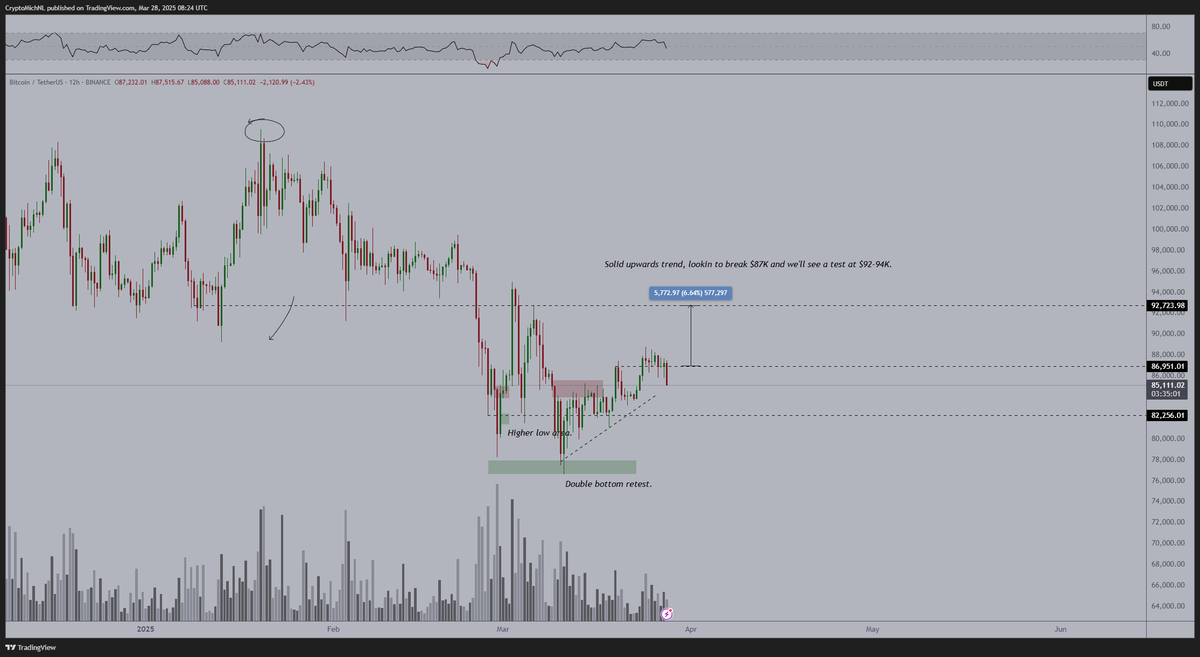24/7 Cryptocurrency News
How Will Donald Trump’s Tariff Plans Impact The Crypto Market?
Published
3 months agoon
By
admin
President-elect Donald Trump is reportedly considering declaring a national economic emergency to implement a universal tariff program targeting allies and adversaries. These tariffs, potentially introduced under the International Economic Emergency Powers Act (IEEPA), will realign global trade balances.
Meanwhile, Federal Reserve Governor Christopher Waller addressed concerns about inflation and the potential economic ramifications of such tariffs. This development raises questions about how these policies may influence the cryptocurrency market.
Donald Trump’s Tariff Strategy
As reported by CNN, President-elect Donald Trump is considering the International Economic Emergency Powers Act (IEEPA) to implement tariffs. The intended tariffs are to rebalance global trade while focusing on the manufacturing sector in the United States. Trump’s preference for IEEPA lies in its flexibility, allowing swift implementation without needing extensive national security justification.
Supporters of the tariffs argue they could rebuild American industrial capacity and strengthen the economy. However, the uncertainty surrounding the scope and execution of these tariffs could ripple through global financial markets. This may influence investor behavior in emerging sectors like the crypto market.
Donald Trump’s deputy assistant for International Economic Affairs, Kelly Ann Shaw, commented,
“I think the president has broad authority to impose tariffs for a variety of reasons, and there are a number of statutory bases to do so.”
Federal Reserve’s Perspective on Tariffs and Inflation
Concurrently, Federal Reserve Governor Christopher Waller has addressed the possible inflationary risks associated with Trump’s tariff proposals. Waller noted that while inflation stalled above the Fed’s 2% target in late 2024, he remains optimistic about a gradual decline in 2025. He added that increased tariffs are unlikely to cause persistent inflation, decoupling their potential effects from broader economic trends.
Waller stated,
“I will support further cuts in 2025, but the pace will depend on further inflation progress. I don’t expect tariffs to have a significant impact on inflation.”
The Federal Reserve lowered interest rates by 25 basis points at the end of 2024, and more cuts will follow based on the inflation rate. The outlook indicates that monetary policy could continue with an accommodative stance in the year 2025. This will support financial markets, including cryptocurrencies, to improve liquidity and investment flow.
Implications of Tariffs on The Cryptocurrency Market
If the Fed cuts interest rates further, as expected by the market, then there is the possibility that more funds could flow into the crypto market for better returns. Usually, such rate cuts fuel risk-on sentiment, so assets such as crypto benefit from it.
However, Donald Trump’s tariff policies may create broader trade uncertainties. This may indirectly influence the crypto market through changes in global economic confidence.
Trade disruptions could lead to diminished faith in traditional financial systems, potentially encouraging a shift toward decentralized digital assets like Bitcoin and Ethereum. On the other hand, if tariffs introduce unforeseen inflationary pressures, the Federal Reserve might pause or reverse rate cuts, which could dampen optimism in the crypto market.
The Federal Reserve and broader economic concerns have been among the major reasons for the cryptocurrency market crash. Rising U.S. Treasury yields and a hawkish Fed stance have fueled risk-off sentiment, drawing capital away from cryptocurrencies.
Ronny Mugendi
Ronny Mugendi is a seasoned crypto journalist with four years of professional experience, having contributed significantly to various media outlets on cryptocurrency trends and technologies. With over 4000 published articles across various media outlets, he aims to inform, educate and introduce more people to the Blockchain and DeFi world. Outside of his journalism career, Ronny enjoys the thrill of bike riding, exploring new trails and landscapes.
Disclaimer: The presented content may include the personal opinion of the author and is subject to market condition. Do your market research before investing in cryptocurrencies. The author or the publication does not hold any responsibility for your personal financial loss.
Source link
You may like


Nasdaq Files To Launch a New Grayscale Avalanche (AVAX) Exchange-Traded Fund


How To Measure The Success Of A Bitcoin Treasury Company


Why ‘Tiger King’ Joe Exotic Launched a Solana Meme Coin From Behind Bars


Trump pardons BitMEX, is ‘Bitcoin Jesus’ Roger Ver next?


Terraform Labs to Open Claims Portal for Investors on March 31


BitGo CEO Calls For Regulation Amid Galaxy Digital’s Settlement
24/7 Cryptocurrency News
BitGo CEO Calls For Regulation Amid Galaxy Digital’s Settlement
Published
4 hours agoon
March 29, 2025By
admin
Mike Belshe, the CEO of BitGo, has commented on the recent settlement between Mike Novogratz’s Galaxy Digital and the New York Attorney General (NYAG). Known as one of the top advocates of deregulation, Belshe, per his latest updates on X, appears to favor regulatory intervention to prevent some fraudulent practices in the industry.
BitGo CEO Comments on Galaxy Digital Settlement
Responding directly to a post from Anthony Scaramucci, Belshe said it is hard to deny that NYAG laid a compelling case against Galaxy Digital. He highlighted the firm’s pump-and-dump actions. The BitGo CEO noted that selling tokens as soon as they are vested and shilling to HODL when one is actually selling is wrong.
Notably, he reiterated his respect for Novogratz and his contributions to the industry. However, considering the NYAG’s position, Mike Belshe said Galaxy Digital’s actions are unethical.
‘So, legal overreach or not, it’s not ethical, and this type of behavior makes our entire industry look bad. Unchecked, this is what leads to “over-regulation,”’ he said, advocating for users to read the controls put onto Galaxy as part of this settlement!
The Advocacy for Crypto Regulation
As reported by CoinGape, Galaxy Digital settled with NYAG with $200 million over the controversial Terra (LUNA) sales. The BitGo CEO said if the right regulations are not in place and top leaders are this manipulative, the industry may not be taken seriously.
In his calls for oversight, Mike Belshe defined this as ‘Principles-based regulation.’ He further explained what he meant, noting that no one should lie to promote assets they hold. He also advocated that influential leaders should not tell others to buy while hiding the fact that they are selling.
Over the past few years, industry leaders have often denounced the regulation through key regulators’ enforcement tactics. Things have changed drastically since Mark Uyeda came on board as Acting Chair of the US SEC.
The commission has even established a Crypto Task Force to help introduce frameworks to guide the industry.
President Trump Fulfilling Campaign Promises
The BitGo CEO’s new crypto regulation push is not on the radar. While industry experts like John Deaton agreed with his proposition, US regulatory agencies are cleaning the house to help fulfill President Donald Trump’s campaign promises.
In a recent update, the FDIC advised Federal Banks about crypto. The commission said financial institutions under its umbrella do not need prior approval to gain exposure to the crypto industry. Thus far, this positive regulatory shift has triggered a new adoption trend for the digital currency ecosystem.
One of the core positive moves was Fidelity Investments’ launch of a stablecoin on a public blockchain.
Godfrey Benjamin
Benjamin Godfrey is a blockchain enthusiast and journalists who relish writing about the real life applications of blockchain technology and innovations to drive general acceptance and worldwide integration of the emerging technology. His desires to educate people about cryptocurrencies inspires his contributions to renowned blockchain based media and sites. Benjamin Godfrey is a lover of sports and agriculture.
Disclaimer: The presented content may include the personal opinion of the author and is subject to market condition. Do your market research before investing in cryptocurrencies. The author or the publication does not hold any responsibility for your personal financial loss.
Source link
24/7 Cryptocurrency News
Here’s Why Crypto Market Is Bleeding Today
Published
13 hours agoon
March 29, 2025By
admin
The drawdown in the broader crypto market has extended to this weekend as losses shifted from Bitcoin (BTC) to altcoins. The combined market cap has lost 2.82% to $2.68 trillion, which suggests the selloff might deepen more. With the mix of bullish news in the trailing 7-day period, the question among analysts remains what is behind the latest slump.
What Is Behind Crypto Market Crash?
Since the inauguration of President Donald Trump, the broader digital currency ecosystem has witnessed positive backing.
As reported earlier by CoinGape, President Trump granted full pardon to Arthur Hayes, and other BitMEX co-founders Benjamin Delo and Samuel Reed. While this news is localized to the beneficiaries, it generally signals the positive shift in White House’ perception of the industry.
Despite these updates, the crypto market is still reeling with losses. The same Trump administration’s trade policies have continued to weigh down investor sentiment. The April 2 reciprocal tariff timeline has placed investors on the edge.
These tariffs and trade wars have ushered in economic uncertainties and potential inflation drag. With the Federal Reserve keeping rates unchanged, the impact of inflation may force traditional firms to adjust their positions. This in turn impact the crypto market sentiment overall.
Bitcoin and Altcoin Performance Review
As of writing, the price of BTC has lost its $83,000 support and currently trading at $82,476.30 per data from CoinMarketCap. The top coin has fallen by 2.43% in 24 hours and has extended its Year-to-Date (YTD) losses to 12.5%.
Top altcoins have also lost their positions with Ethereum down 2.25% to $1,846. XRP has fallen by more than 3% to $2.115, while Cardano has shed off 3.92% to $0.6721. The altcoin response has seen Dogecoin forming a wedge pattern in what may serve as a make-it-or-break-it switch for the memecoin.
While it appears as though many of these top assets are bottoming out, their correlations with Bitcoin may extend their overall drawdow.
What Next for the Crypto Market?
Thus far this year, top coins like Bitcoin have often showcased resilience in the face of massive sell-off and crypto liquidations. Although the current price floor for Bitcoin remain undefined, with analysts keeping an eye on the $82,000 floor.
The digital currency has not breached this level in close to two weeks. While legendary trader Peter Brandt agrees BTC price may fall to $65,635, this bearish projection may be averted if the $82,500 support holds through the weekend.
Altcoins may likely boost their price recovery by relying on BTC breakout and their internal fundamental updates.
Godfrey Benjamin
Benjamin Godfrey is a blockchain enthusiast and journalists who relish writing about the real life applications of blockchain technology and innovations to drive general acceptance and worldwide integration of the emerging technology. His desires to educate people about cryptocurrencies inspires his contributions to renowned blockchain based media and sites. Benjamin Godfrey is a lover of sports and agriculture.
Disclaimer: The presented content may include the personal opinion of the author and is subject to market condition. Do your market research before investing in cryptocurrencies. The author or the publication does not hold any responsibility for your personal financial loss.
Source link
24/7 Cryptocurrency News
Here’s Why Peter Schiff Predicts Bitcoin (BTC) Price Crash to $10K
Published
21 hours agoon
March 29, 2025By
admin
Peter Schiff, a BTC critic, has recently predicted that Bitcoin price could plummet to as low as $10,000. Schiff has expressed concerns over Bitcoin’s long-term viability, particularly in comparison to gold. His argument revolves around Bitcoin’s current performance, which he believes is being driven by short-term hype rather than solid fundamentals.
Schiff’s prediction is particularly alarming for those who view Bitcoin as a store of value. In the current trends, Peter Schiff notes that millions of young people are invested in Bitcoin while gold, a standard hedge, is pushing higher.
This view stems from his assertion that when gold prices rise to new record levels then the value of Bitcoin may plummet.
“By the time they get to their target of $5K for gold, they will drag Bitcoin down to $10K, meaning a drop of 95% from the highest it was valued at in 2021,” Schiff reasoned.
Bitcoin Price Recent Performance Against Gold
According to Peter Schiff, Bitcoin price has underperformed in relation to gold. Gold prices recently broke through $3,000 per ounce as global economic conditions continued to affect the global economy. Meanwhile, Bitcoin has depreciated in value, especially in terms of the precious metal, gold.
Since early 2025, the prices of Bitcoin have come down by over 30% against gold with one Bitcoin currently only equivalent to 27.4 ounces of gold as compared to 41 ounces in December of 2021.
If Bitcoin is an asset that people only buy when the stock market is going up and risk appetite is high, what is it that investors are buying? It’s not a stock as it will never have earnings or pay a dividend. It’s clearly not a risk-off asset, a store of value, or digital gold.
— Peter Schiff (@PeterSchiff) March 28, 2025
Another issue that Schiff dislikes about Bitcoin also revolves around its categorization as a “risk asset.” He says that BTC price movements are synchronized with the rest of the market, especially when investors are more willing to take risks. While gold provides investors with a safe-haven, the Bitcoin price operation is defined as having a volatility closer to that of the traditional markets among investors. Therefore, as argued by Peter Schiff, BTC price may decline as investors turn to the safe-havens, such as gold, in turbulent times.
Market Analyst Weigh In On Bitcoin Trend
Several market analysts are echoing Schiff’s concerns, suggesting that Bitcoin price could face challenges in the near term. Peter Brandt, a veteran trader, has pointed out that Bitcoin might be on a path to $65,635, citing a “bear wedge” pattern that has emerged in the cryptocurrency’s price charts.
Meanwhile, crypto trader Michaël van de Poppe shared his own cautious outlook on Bitcoin’s short-term prospects. Van de Poppe noted that while Bitcoin price has been holding above the $80,000 mark, its price action is starting to show signs of weakness. He added, “It starts to look slightly less good,” and suggested that if Bitcoin falls below $84,000, a deeper correction could be imminent.
Similarly, the crypto trader TheKingfisher expressed doubts about a sustained bullish recovery, indicating that Bitcoin’s current price movement aligns with a typical market cooldown. He suggested that Bitcoin could be approaching a “seasonal reset” as part of the broader market trend.
Alternative Views on Bitcoin’s Future Trend
Not everyone shares Peter Schiff’s pessimism about Bitcoin price. Charlie Morris, founder of ByteTree, highlighted that despite recent challenges, Bitcoin may have already seen its worst. He explained that while gold ETFs are experiencing slower inflows, Bitcoin could be positioned for a potential recovery.
This view contrasts sharply with Peter Schiff’s, emphasizing that the cryptocurrency may not be as doomed as some critics suggest.
Additionally, Robert Kiyosaki, author of Rich Dad Poor Dad, has weighed in on the broader market of precious metals and cryptocurrencies. While Kiyosaki acknowledged Bitcoin’s role as a hedge against inflation, he predicted that silver would outperform both Bitcoin and gold in the near term
Kelvin Munene Murithi
Kelvin is a distinguished writer with expertise in crypto and finance, holding a Bachelor’s degree in Actuarial Science. Known for his incisive analysis and insightful content, he possesses a strong command of English and excels in conducting thorough research and delivering timely cryptocurrency market updates.
Disclaimer: The presented content may include the personal opinion of the author and is subject to market condition. Do your market research before investing in cryptocurrencies. The author or the publication does not hold any responsibility for your personal financial loss.
Source link

Nasdaq Files To Launch a New Grayscale Avalanche (AVAX) Exchange-Traded Fund

How To Measure The Success Of A Bitcoin Treasury Company

Why ‘Tiger King’ Joe Exotic Launched a Solana Meme Coin From Behind Bars

Trump pardons BitMEX, is ‘Bitcoin Jesus’ Roger Ver next?

Terraform Labs to Open Claims Portal for Investors on March 31

BitGo CEO Calls For Regulation Amid Galaxy Digital’s Settlement

Ethereum Bulls Disappointed As Recovery Attempt Fails At $2,160 Resistance

US recession 40% likely in 2025, what it means for crypto — Analyst

Crypto Investment Firm Galaxy Digital Settles With New York AG for $200,000,000 Over Luna Allegations

Bitcoin Covenants: CHECKTEMPLATEVERIFY (BIP 119)

This Week in Bitcoin: GameStop Reveals Reserve, But Inflation Fears Rear Their Head

Solana price prepares a wild ride as risks rise

FTX to Begin $11.4B Creditor Payouts in May After Years-Long Bankruptcy Battle

Here’s Why Crypto Market Is Bleeding Today

Support Or Resistance? Chainlink (LINK) Investor Data Suggests Key Price Zones

Arthur Hayes, Murad’s Prediction For Meme Coins, AI & DeFi Coins For 2025

Expert Sees Bitcoin Dipping To $50K While Bullish Signs Persist

Aptos Leverages Chainlink To Enhance Scalability and Data Access

Bitcoin Could Rally to $80,000 on the Eve of US Elections

Sonic Now ‘Golden Standard’ of Layer-2s After Scaling Transactions to 16,000+ per Second, Says Andre Cronje

Institutional Investors Go All In on Crypto as 57% Plan to Boost Allocations as Bull Run Heats Up, Sygnum Survey Reveals

Crypto’s Big Trump Gamble Is Risky

Ripple-SEC Case Ends, But These 3 Rivals Could Jump 500x

Has The Bitcoin Price Already Peaked?

A16z-backed Espresso announces mainnet launch of core product

Xmas Altcoin Rally Insights by BNM Agent I

Blockchain groups challenge new broker reporting rule

The Future of Bitcoin: Scaling, Institutional Adoption, and Strategic Reserves with Rich Rines

Trump’s Coin Is About As Revolutionary As OneCoin

Is $200,000 a Realistic Bitcoin Price Target for This Cycle?
Trending

 24/7 Cryptocurrency News5 months ago
24/7 Cryptocurrency News5 months agoArthur Hayes, Murad’s Prediction For Meme Coins, AI & DeFi Coins For 2025

 Bitcoin2 months ago
Bitcoin2 months agoExpert Sees Bitcoin Dipping To $50K While Bullish Signs Persist

 24/7 Cryptocurrency News3 months ago
24/7 Cryptocurrency News3 months agoAptos Leverages Chainlink To Enhance Scalability and Data Access

 Bitcoin5 months ago
Bitcoin5 months agoBitcoin Could Rally to $80,000 on the Eve of US Elections

 Altcoins2 months ago
Altcoins2 months agoSonic Now ‘Golden Standard’ of Layer-2s After Scaling Transactions to 16,000+ per Second, Says Andre Cronje

 Bitcoin5 months ago
Bitcoin5 months agoInstitutional Investors Go All In on Crypto as 57% Plan to Boost Allocations as Bull Run Heats Up, Sygnum Survey Reveals

 Opinion5 months ago
Opinion5 months agoCrypto’s Big Trump Gamble Is Risky

 Price analysis5 months ago
Price analysis5 months agoRipple-SEC Case Ends, But These 3 Rivals Could Jump 500x




✓ Share: